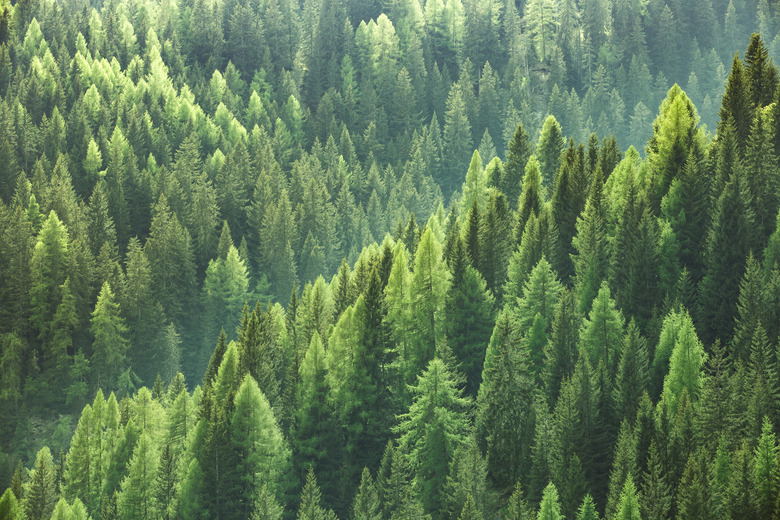Factors Affecting The Ecosystem
An ecosystem is defined as a complex of living organisms, their physical environment – which includes rocks, minerals, soils, sunlight, water, climate and other abiotic factors – and the interrelationships between them within a given area. An ecosystem can exist on many scales, from a single spoonful of soil to forests that span continents.
What Are Ecosystem Processes?
What Are Ecosystem Processes?
Ecosystems are dynamic, constantly changing environments that react in response to stresses and pressures within the environment. There are four factors that control the balance of an ecosystem: the water cycle, the mineral cycle, energy flow and community dynamics.
Community dynamics within an ecosystem change over time in a process known as succession. This process is essential for maintaining the health of an ecosystem. Succession can occur rapidly following disturbance such as fire, where fast-growing 'pioneer' flowers and herbs colonize areas quickly and which are then followed by grasses, shrubs and trees.
After several stages of succession, it may appear to reach a state of ecosystem stability or climax, such as in a mature forest. However, there is a constant process of succession as organisms grow, interact, reproduce, die and decompose. There are shifts in species diversity, abundance and population age structure that occur slowly over time.
What Types of Ecosystems Are There?
What Types of Ecosystems Are There?
The broadest categories of ecosystems are grasslands, deserts, forests, tundra, freshwater and marine ecosystems. These can be further defined based on their climate, ecology and species diversity. Forest types include conifer, deciduous and tropical systems, and grasslands are classified as tall-grass, mixed-grass and short-grass.
Freshwater ecosystems can be lakes, rivers and wetlands, and marine types include tidal pools, seagrass beds and coral reefs. All these ecosystems can be further sub-classified, down to a microscopic level if necessary.
Factors That Influence Ecosystems
Factors That Influence Ecosystems
A variety of biotic and abiotic factors can affect an ecosystem. Disturbances within an ecosystem can be beneficial, as they promote a surge in the succession process. However, repeated disturbances can impact an ecosystem's ability to regenerate and perform essential ecosystem processes.
Human factors affecting ecosystems include land clearing for agriculture or development, increased occurrence of fires, drainage of wetlands and dam construction on rivers.
Climate change can also affect ecosystems by reducing the availability of water, increasing temperature extremes and increasing the occurrence and intensity of flood events, wildfires and destructive storm patterns.
Agriculture
Agriculture
Modern agriculture affects ecosystems in several ways. The plowing of soil causes significant disturbance and creates conditions that favor quick-growing annual crops. It also promotes the growth of weeds and other pioneer species. These species represent the start of the successional evolution of the ecosystem. However, repeated plowing does not allow the system to develop to its climax state. It also damages the soil structure and removes the protective layer of plant matter.
The application of fertilizers and the spraying of pesticides and herbicides also disrupts the ecosystem by reducing complexity, which then makes the overall system less healthy or able to respond to environmental stresses.
Urban Development
Urban Development
Urban development converts healthy, productive ecosystems into large areas with little biological activity. As well as roads, buildings and pavement, this can include parks, lawns and gardens, where many native species are removed to make way for just a few introduced species.
Urban development also fragments habitat, which breaks up populations, causes changes in the habitat due to 'edge effect' and makes it harder for species to respond to changes in the environment.
Climate Change
Climate Change
All ecosystems have the capacity to change and adapt in response to a changing climate. However, an ecosystem is less resilient when it has been impacted by human activities. Species cannot migrate to more hospitable climates if their habitat has been fragmented, and drought can be more devastating when there is also a higher incidence of fires due to human activity. Agricultural areas are more prone to erosion as the soil is often damaged from repeated exposure and other soil-disturbing activity.
Other Species
Other Species
Humans have introduced many non-native plants and animals into new ecosystems throughout the world. As they often lack natural predators, many introduced species increase in size and distribution rapidly, with significant consequences for the local biology. For instance, the introduction of rats to islands has wiped out many bird populations. Introduced pines can choke out native species and make the soil more acidic from the breakdown of their needles.
Cite This Article
MLA
Michelle, Meg. "Factors Affecting The Ecosystem" sciencing.com, https://www.sciencing.com/factors-affecting-the-ecosystem-13428099/. 30 September 2021.
APA
Michelle, Meg. (2021, September 30). Factors Affecting The Ecosystem. sciencing.com. Retrieved from https://www.sciencing.com/factors-affecting-the-ecosystem-13428099/
Chicago
Michelle, Meg. Factors Affecting The Ecosystem last modified August 30, 2022. https://www.sciencing.com/factors-affecting-the-ecosystem-13428099/
